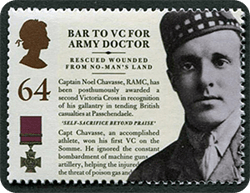 Mental health is becoming increasingly important in the workplace. Once thought of as something that happened to an unfortunate few, we now know that it is incredibly common: at least 1 in 4 people now experience a mental health problem at some point in their life.
Mental health is becoming increasingly important in the workplace. Once thought of as something that happened to an unfortunate few, we now know that it is incredibly common: at least 1 in 4 people now experience a mental health problem at some point in their life.
In this age of austerity and focus on the bottom line can organisations really afford to ignore mental health in the workplace? Continue reading

 He was a prize-winning academic, qualified as a doctor, played rugby and represented Great Britain in the 1908 Olympics, running alongside his twin brother, Christopher, in the 400m.
He was a prize-winning academic, qualified as a doctor, played rugby and represented Great Britain in the 1908 Olympics, running alongside his twin brother, Christopher, in the 400m. Over the years The Apprentice has ensured an incredibly diverse group of candidates.
Over the years The Apprentice has ensured an incredibly diverse group of candidates.